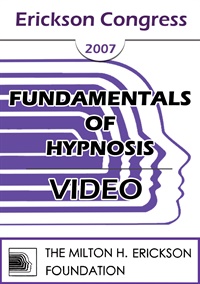
- Average Rating:
- Not yet rated
- Topic Areas:
- Short Courses | Ericksonian Hypnosis and Therapy Techniques | Hypnotherapy | Hypnosis | Social Issues
- Categories:
- Erickson Congress | Erickson Congress 2004
- Faculty:
- Halim Faisal, MSW | Diane Holliman, PhD
- Duration:
- 1:19:41
- Format:
- Audio Only
- Original Program Date:
- Dec 02, 2004
- Short Description:
- Hypnotherapy has been an under-used tool in social work. However, the principles of Ericksonian hypnotherapy are quite congruent with social work especially in serving at risk populations. Examples of how to use Ericksonian hypnotherapy and evaluate outcomes with at risk populations will be presented.
- Price:
- $15.00 - Base Price
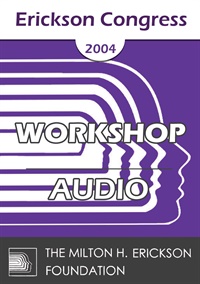
- Average Rating:
- Not yet rated
- Topic Areas:
- Workshops | Ericksonian Hypnosis and Therapy Techniques | Metaphors | Hypnotherapy
- Categories:
- Erickson Congress | Erickson Congress 2004
- Faculty:
- Jorge Abia, MD | Rafael Nuñez, MA | Jesus Almada, MA
- Duration:
- 1:56:00
- Format:
- Audio Only
- Original Program Date:
- Dec 04, 2004
- Short Description:
- Hypnotic conversation was a main contribution of Milton H. Erickson, M.D. Metaphor is a unique resource that allows patients to totalize visions of their problems and orient themselves to solutions. A theoretical review and fifteen question technique to elicit metaphors and utilize them in therapy, will be presented.
- Price:
- $15.00 - Base Price
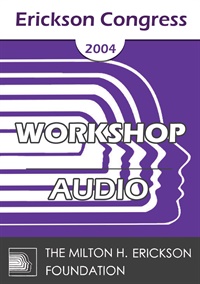
IC04 Workshop 41 - Hypnotherapy as a Jazz Duet: Principles of Improvisation - Douglas Flemons, Ph.D.
- Average Rating:
- Not yet rated
- Topic Areas:
- Workshops | Improvisation | Art and Creativity | Hypnotherapy
- Categories:
- Erickson Congress | Erickson Congress 2004
- Faculty:
- Douglas Flemons, PhD
- Duration:
- 2:39:30
- Format:
- Audio Only
- Original Program Date:
- Dec 05, 2004
- Short Description:
- Like jazz musicians improvising a duet, you and your hypnosis clients sizzle best when you're in sync and when your improvised communications inspire fresh exploration and discovery of meaningful change. Learn and practice three essential principles for structuring effective hypnotherapeutic improvisations. 1) Always Connect! 2) Think Pattern! 3) Experiment, Listen, Respond!
- Price:
- $15.00 - Base Price
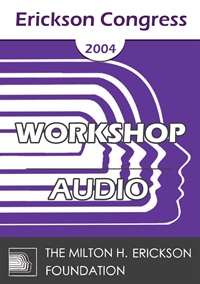
- Average Rating:
- Not yet rated
- Topic Areas:
- Workshops | Anxiety | Depression | Hypnotherapy | Panic
- Categories:
- Erickson Congress | Erickson Congress 2004
- Faculty:
- Sofia Bauer
- Duration:
- 1:48:36
- Format:
- Audio Only
- Original Program Date:
- Dec 05, 2004
- Short Description:
- In working with the problems of panic disorder, phobias and depression, this workshop will show how new hypnotic techniques using paradoxical behavior can effect solutions.
- Price:
- $15.00 - Base Price
- Average Rating:
- Not yet rated
- Topic Areas:
- Fundamentals of Hypnosis | Hypnosis | Hypnotherapy
- Categories:
- Erickson Congress | Erickson Congress 2007
- Faculty:
- Stephen Gilligan, PhD
- Course Levels:
- Master Degree or Higher in Health-Related Field
- Duration:
- 2:57:10
- Format:
- Audio and Video
- Original Program Date:
- Dec 09, 2007
- Short Description:
- The “Creative Unconscious” in hypnotherapy can be seen as residing in neither the client nor the therapist, but in the relationship between them. This workshop will explore how the therapists can use their own experiential self to develop this special relationship and use it as part of diagnosis, trance induction, creative problem solving and ongoing feedback.
- Price:
-
Sale is $29.00
price reduced from Base Price - $59.00

- Average Rating:
- Not yet rated
- Topic Areas:
- Workshops | Hypnotherapy | Therapist Development | Trance
- Categories:
- Erickson Congress | Erickson Congress 2007
- Faculty:
- Douglas Flemons, PhD
- Duration:
- 1:47:43
- Format:
- Audio Only
- Original Program Date:
- Dec 06, 2007
- Short Description:
- Hypnotherapists risk frustration and failure when they strive to make something happen with clients – to induce them into trance and insti- gate change. A far more effective alternative is to invite clients into trance and co-discover possibilities of change. Participants will have opportunities to practice this collaborative approach to hypnotherapy.
- Price:
- $15.00 - Base Price
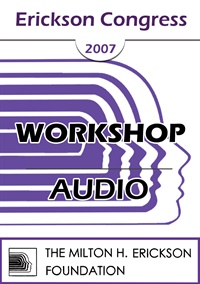
- Average Rating:
- Not yet rated
- Topic Areas:
- Workshops | Hypnotherapy | Therapist Development
- Categories:
- Erickson Congress | Erickson Congress 2007
- Faculty:
- Philip Accaria, PhD | Philip Appel, PhD
- Duration:
- 1:56:01
- Format:
- Audio Only
- Original Program Date:
- Dec 06, 2007
- Short Description:
- In this workshop, Drs. Accaria and Appel will discuss their use of energy-based medicine techniques and how they integrate them into their clinical and hypnotherapy practices. Topics addressed will include: how to introduce energy-based methods to clients; how to determine with which clients to use these methods; how the clinician might market/advertise his/her use of energy-based techniques.
- Price:
- $15.00 - Base Price
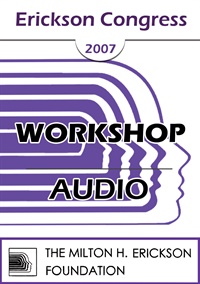
- Average Rating:
- Not yet rated
- Topic Areas:
- Workshops | Hypnosis | Hypnotherapy | Therapist Development
- Categories:
- Erickson Congress | Erickson Congress 2007
- Faculty:
- Jane Parsons-Fein
- Duration:
- 1:50:18
- Format:
- Audio Only
- Original Program Date:
- Dec 06, 2007
- Short Description:
- A blend of sculpting and hypnotic language is an effective tool to move a client, a couple, a family, or an organization out of an impasse. You can sculpt any idea, family pattern, group process, hope, dream, obstacle or relationship by putting it outside the self and observing it, which re-organizes and metabolizes it on new levels.
- Price:
- $15.00 - Base Price

- Average Rating:
- Not yet rated
- Topic Areas:
- Short Courses | Hypnotherapy
- Categories:
- Erickson Congress | Erickson Congress 2007
- Faculty:
- Susan Dowell, MSW
- Duration:
- 1:18:44
- Format:
- Audio Only
- Original Program Date:
- Dec 07, 2007
- Short Description:
- Hypnoprojectives are a tool that can help us utilize the potentialities of the hypnotic process and enable our patients to do their own reframing. It can be used to expand awareness, shift perspectives and draw upon internal resources split off from conscious awareness. Attendees will be introduced to the use of Hypnoprojectives, learn two basic protocols and practice and discuss clinical applications.
- Price:
- $15.00 - Base Price

- Average Rating:
- Not yet rated
- Topic Areas:
- Short Courses | Hypnotherapy | Mindfulness | Utilization | Affect
- Categories:
- Erickson Congress | Erickson Congress 2007
- Faculty:
- Carolyn Daitch, PhD
- Duration:
- 1:19:13
- Format:
- Audio Only
- Original Program Date:
- Dec 07, 2007
- Short Description:
- Incorporation of a few simple, easy-to-learn, easy-to-practice hypnotic interventions can be an effective adjunct to other treatment modalities. This workshop will offer participants a side-ranging selection of different hypnotherapeutic tools that can be used to promote affect regulation. Attendees will be introduced to the Affect Regulation Toolbox, a collection of tools with six therapeutic objectives to treat the over-reactive client: mindfulness, sensory awareness and cues, impulse control, co-existing affective states, resource utilization and positive affect development.
- Price:
- $15.00 - Base Price
Please wait ...


